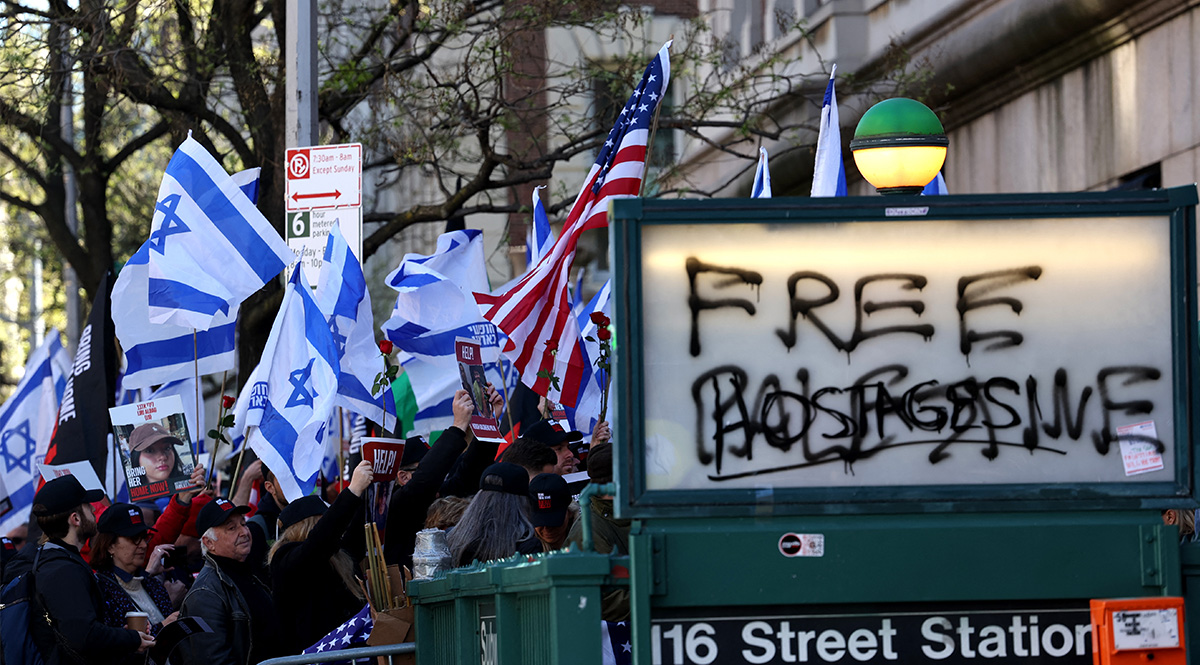Ukraine Likely to Face Pressure for Peace after the U.S. Presidential Election
Regardless of the outcome of the U.S. presidential election, the goal of the new authorities will be to bring an end to the Russian aggression against Ukraine as soon as possible. Although the administrations of Kamala Harris and Donald Trump would differ in their approaches to possible peace negotiations and potential Ukrainian concessions to Russia, both will push for increased European responsibility for supporting Ukraine.
.png) ABACA / Abaca Press / Forum
ABACA / Abaca Press / Forum
The issue of U.S. assistance to Ukraine in its fight against Russia is not a major motivating factor for the preferences of U.S. voters, whose assessments of the support clearly diverge along party lines. The topic has been present in the election campaign mainly because of the troubling statements made by Trump and his vice-presidential running mate, J.D. Vance, regarding the potential withholding of support and the push for a quick end to the war. Joe Biden’s withdrawal from re-election and Harris’ subsequent party nomination have made it likely that a victory for the Democrats also could be associated with an adjustment in U.S. policy towards Ukraine.
Harris’ Views on the War in Ukraine
As vice president in the Biden administration, Harris has been closely involved in issues of U.S. support for Ukraine. Shortly after the start of the Russian full-scale invasion, she coordinated with her NATO partners on U.S. military assistance (she visited Poland and Romania at the time) and tightening sanctions on Russia. In addition, she represented the U.S. at a peace summit in Switzerland in June this year. Throughout the period, she has consistently emphasised support for Ukrainian independence and territorial integrity. During the Democratic National Convention in August this year, when she formally accepted the nomination as its candidate in the presidential election, Harris publicly announced continued U.S. support for Ukraine in the event of her victory.
However, the main issue determining U.S. policy towards Ukraine will remain U.S. relations with Russia. Thus, if the Democrats remain in power, the leading factor in U.S. policy will continue to be the fear of escalation on the part of Russia and “provoking” it into extending the conflict to NATO countries. For this reason, Harris would continue to raise Russia’s costs of waging war by maintaining existing sanctions and imposing new ones, but would probably not opt for a significant increase in military support for Ukraine that would give it the upper hand on the frontlines.
Continued military support will be hampered by the waning support of the American public for Ukraine—currently, only 19% of those surveyed say the scale of aid is insufficient, 26% say it is adequate, and 29% indicate that there’s too much support (Pew Research Center). It is also uncertain whether Harris would succeed in convincing Congress to pass another aid package. Indirectly, her position may also be influenced by progressive Democrats, who for years have advocated a reduction in the defence budget and emphasised the superiority of diplomacy over military solutions. The combination of these factors could, on the one hand, prompt a potential new president to try to seek a compromise to end the war by urging Russia and Ukraine to hold peace talks, while, on the other hand, urging European allies to take more responsibility for Ukraine’s military and economic security.
The Trump-Vance Signalled Approach
Trump has reiterated that if he wins the election, he will end the war between Russia and Ukraine within 24 hours, before he even takes power. His words should be viewed as election rhetoric, but they nevertheless indicate that Trump will try to end the conflict as soon as possible, which would now require far-reaching concessions from Ukraine. He has been critical of continued support for Ukraine, although he ultimately did not urge Republicans to block the aid package passed by Congress in April. Even more reluctant to help Ukraine is the Republican vice presidential candidate, Senator J.D. Vance, who has consistently advocated stopping it, saying it is not in the U.S. interest.
A possible second Trump administration would likely try to force Ukraine and Russia to start peace talks as soon as possible by applying political and economic pressure to them and threatening to withhold aid to Ukraine. At the same time, there would be a risk that, arguably unlike the Harris administration, the U.S. position towards potential Ukrainian-Russian talks would not be consulted with NATO allies. The U.S. could even withhold military aid to Ukraine on the grounds that it does not want to interfere in the negotiations, leaving the issue to European countries. In addition, U.S. relations with Ukraine during a second Trump term could be hampered by actions and statements from his first presidency. Then, he attempted to pressure Ukrainian President Volodymyr Zelensky into an anti-corruption investigation of Biden’s son Hunter and was ultimately subjected to impeachment proceedings by Congress as a result.
Ukraine Facing U.S. Presidential Election
The Ukrainian authorities are trying to avoid at all costs a situation in which aid to their country becomes the subject of an internal political dispute during the U.S. election campaign, as it would risk that it would be reduced or withheld. Regardless of the election’s outcome, Ukraine’s priority will be to secure long-term military and financial support from the United States. To this end, the Ukrainian authorities are trying to maintain regular contacts with representatives of both presidential candidates. In July this year, shortly after the failed assassination attempt on Trump, President Zelensky had a telephone conversation with him. In turn, Andriy Yermak, the head of Zelensky’s administration, spoke by phone with Harris’ national security adviser Phil Gordon shortly after Biden’s re-election withdrawal. The Ukrainian government is also trying to curry favour with factions from both U.S. political camps by hosting delegations of both Republican hard-right conservatives and Democratic left-wing progressives in Kyiv.
Ukraine expects that whatever the outcome of the election, the new U.S. administration, especially if Trump wins, will pressure it to negotiate with Russia. As a result, the Ukrainian government is increasingly open about its readiness for talks and is building an international coalition of countries that support Ukraine’s vision of ending the war—the so-called Zelensky peace formula. So far, however, they have failed to convince the Biden administration of their plan. So, at the end of August this year, President Zelensky announced the preparation of a Ukrainian “victory plan”, which he intends to submit to Biden, but also to Harris and Trump.
At the same time, the Ukrainian authorities are working in the final months of Biden’s presidency to get him to back down from the restrictions imposed on Ukraine on the use of Western long-range weapons to attack Russia. That was one of the goals of the Ukrainian armed forces’ operation in the Kursk region, which began in early August. Media reports indicate that Ukraine intends to present a list of potential targets within Russia for Biden to approve soon.
Perspectives
The U.S. commitment to Ukraine reached its peak under President Joe Biden. Whatever the outcome of the election, the new U.S. administration will seek to reduce it and push its partners in Europe to take greater responsibility for the military and financial support of Ukraine. At the same time, it will seek to end the war as soon as possible, with Trump more likely than Harris to pressure Ukraine into talks with Russia.
Given the limited ability of the U.S. to pressure Russia, the most likely scenario at present is a freeze of the conflict. In this situation, Ukraine would seek to make as few concessions to Russia as possible and maintain as much U.S. military support as possible to further expand its capabilities. At the same time, there is a likelihood that in the event of the failure of possible peace talks due to the Russian government’s over-reaching demands or lack of willingness to engage in talks at all, the U.S. would actually be forced to increase military aid to Ukraine.
The possible failure of a new U.S. administration to consult with NATO allies about potential peace talks, including a formal agreement between Ukraine and Russia, would result in a crisis of confidence in transatlantic relations. The failure to include U.S. partners could raise legitimate doubts about U.S. security policy goals in Europe. This would entail a deterioration of their overall relationship with the U.S., beyond the issue of ongoing support for Ukraine.






.png)